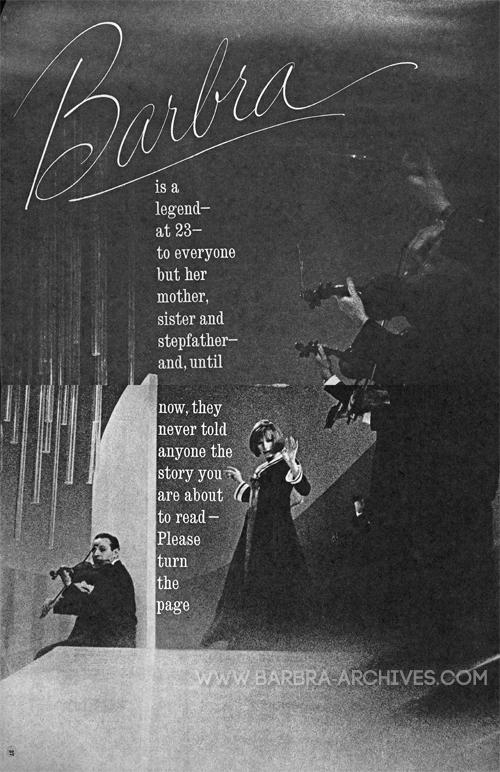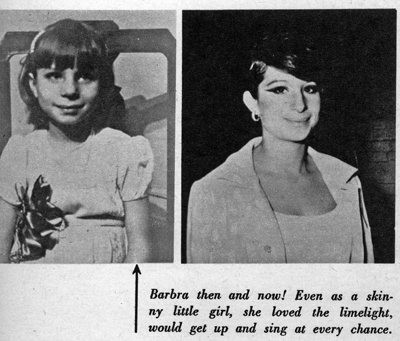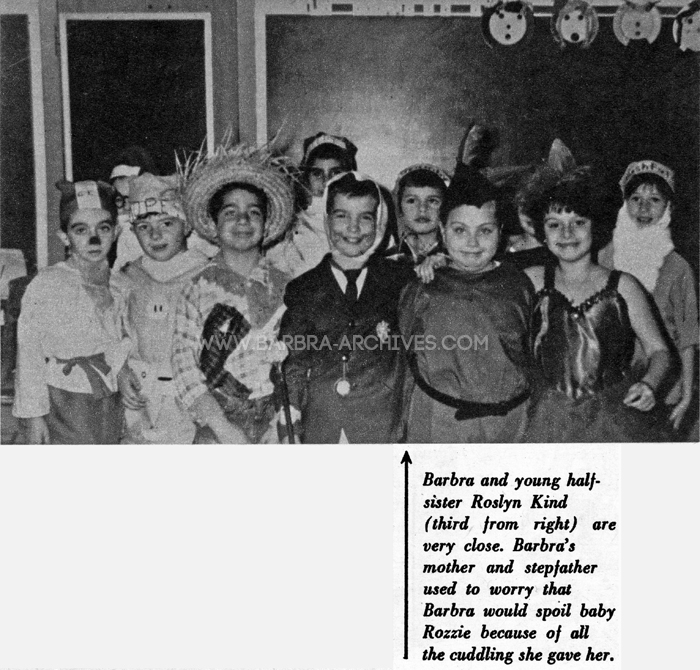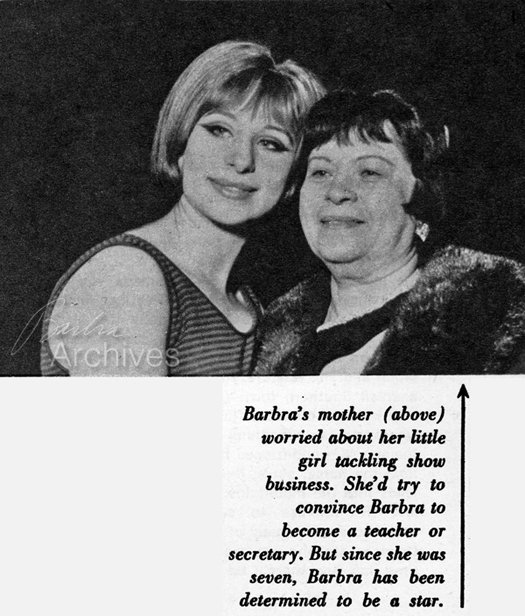TVR

1965

Barbra Streisand is this year’s “instant star.” She has won every TV and Broadway award in the book. She has been named the Number One singer around. She has fame, she has money and she has the loyalty and admiration of critics and fans alike.
At 23, Barbra Streisand has become a legend!

Sometimes, what has happened to her seems like a fairy tale. But the real story of Barbra Streisand is very different from that. In Brooklyn, where she grew up, life was not made of magic.
When Barbra was 15 months old, her father died suddenly of a cerebral hemorrhage. He had been a teacher, a brilliant, highly educated man who held a PhD.
After his death, his widow, Diana, moved back to her parents home on Brooklyn’s Pulaski Street. As soon as she got over her loss to a fair degree, she went back to work as a secretary. Left with two small children, Sheldon, nine, and little Barbara (as Barbra’s name was spelled before she herself decided to change it), there was nothing else for Mrs. Streisand to do.
“Mine was a singing family,” Barbra’s mother recalls. “My father was a tailor who also served as a part-time cantor in the neighborhood Jewish Temple. I guess I grew up as Barbra grew up, hearing singing around me. My greatest pleasure in those days was listening to singers on our Victrola. I’ve always loved to sing—I still do—but my parents wouldn’t have dreamt of letting me do it professionally.”
“I remember when I was 17, I registered with my best girlfriend to sing in the Metropolitan Opera Chorus. But we attended rehearsal only once. It brought us home too late and worried our parents. So both of us girls gave it up and put it out of our minds. Still, when we went out to parties, I could always be found in the group of boys and girls singing around the piano. I was far too shy to sing alone before a crowd, but in a group, I loved it.”
Recently, when Richard Hayes substituted for Jack Sterling on Sterling’s morning CBS Radio show, Hayes played a recording Barbra’s mother made several years ago. Her voice was clear and true, and though it showed none of the Streisand style, Barbra’s mother received several offers to appear on TV shows.
“Somebody wrote that I was trying to compete with my daughter, which is silly,” Barbra’s mother explains. “I don’t sing like Barbra; I sing a melody simply. I’m too busy working and raising my younger daughter to want to pursue a singing career now. But it’s nice to know that someone wants me to. I could never appear before many people, but recording in a quiet room, I think I could do that. Anyway, it’s in the back of my mind. Maybe I’ll do it someday; who knows!
“Getting back to Barbra, she was a skinny, determined little girl who, even at the age of five, accepted any challenge.
“I remember a day when my friend and I took our kids for an afternoon’s outing at Brooklyn’s Botanical Gardens. Her boy was six-and-a-half, and Barbra was five. There are some small bridges there, and to show off, my friend’s boy climbed outside the railing of one of them and was walking precariously on about six inches of steel outside. In an ‘anything you can do, I can do better’ mood, Barbra climbed over the railing, too. The next thing we knew, she had fallen into a pond. It wasn’t deep and we easily fished her out, but she was drenched and the sun was going down. To make matters worse, it had turned cold. I had to pull off her wet clothing, wrap her in my coat and rush to get a taxi to take us home. Luckily, I found one. Barbra was none the worse, but I realized, perhaps for the first time, how competitive my little girl was.
“Barbra and I always sang around the house. She’d listen to singers on the radio and, later, on television and try to see how she’d sing their songs.
“I remember when she was seven, she was to make her first public appearance singing at a P.T.A. meeting. She was awfully excited about it. But when the day came, she had a cold. I put her to bed and told her to forget about the P.T.A. but she wouldn’t hear of it. She stayed in bed all day but got up in the evening. She put on her new dress, which was pretty but hung like a rag on her because she was so thin. Tired as I was, I had to get dressed up, high heels and all, and take her to that P.T.A. meeting. Cold or no cold, she sang—she always had that kind of determination. Of course, I put her to bed when we got home. But she had had her moment of applause and was satisfied!”

It was about this time that Diana Streisand met Louis Kind. He was in the automobile business; she was then a secretary in Children’s Court and had gone to Brooklyn College to take the courses necessary to pass her examinations to become a school secretary. At this time, the Streisands were still living with Mrs. Streisand’s parents.
Whenever Louis Kind would call to take Mrs. Streisand out for the evening, Barbra would cling to her mother and beg, “Don’t go out and leave me, stay here with me, please.”
And her mother and Mr. Kind would have to explain that they would be back early—there was nothing to worry about. On many occasions, they took Barbra with them on picnics.
Mr. Kind was aptly named—he was kind and good. He loved children. Diana Streisand knew her kids needed a home with her in it to look after them all day, not just when she came in, tired from work. When Louis Kind proposed, Diana accepted. They took an apartment on Newkirk Avenue, which, in those days, was in the newer section of Brooklyn.
Mr. Kind has told TV RADIO MIRROR, “Barbra and her brother Sheldon were nice children. I tried to show them I liked them. It took Barbra a little while to accept me, even though she had no remembrance of her own father. But she was a sensitive child and I imagine she thought she would be disloyal if she called me ‘Daddy.’ She never did. She called me ‘Louis,’ just as her mother did. I had to be satisfied with this. She was a shy little girl and sometimes moody, but terribly smart and loving, once you won her confidence. I’m sure she didn’t like being uprooted from her grandparents’ home. To ease the tensions at this time, we sent Barbra to visit them often. She loved them dearly. Sometimes Barbra and I would get along fine—sometimes she’d seem remote.
“She loved playing games with me, especially patty-cake. And she loved the ice-cream treats I bought her. I let her mother do all the disciplining and I tried to provide the fun.”
A little girl with big brains
Mrs. Kind says, “My main worries about Barbra as a child were due to the fact that she wouldn’t eat well and she didn’t do her homework. I was always afraid she wouldn’t get promoted; but she got all her assignments done in class and didn’t have to study. She always passed her subjects with high marks.
“Sheldon was busy with his friends in the Boy Scouts. He had his own interests in art and design and had many hobbies.
“Barbra wasn’t a joiner, even in school. But she came by her singing as naturally as Sheldon came by his designing.
“At home, we’d sing a lot. Barbra would like nothing better than to sit on the stoop of our house and sing loud enough for the neighbors to open their windows, listen, clap and ask for more. And when we went to the Catskills for our summer vacations, Barbra always jumped at the chance to sing. Sometimes she’d end her performance with a somersault which was applauded as loudly as her singing.”
When Barbra was nine, her mother became pregnant. The Kinds worried about whether Barbra would accept the newcomer—but they didn’t need to. Barbra loved the baby right away and was anxious to learn how to care for her. She always wanted to hold her and sing her to sleep.
The Kinds even became a little worried about Barbra spoiling baby Roslyn with all the attention and fuss she made over her. When Roslyn was three, Barbra taught her to sing and dance. She’d invite her school friends over to show off little Rozzie. “It was cute, watching them dance together and seeing how proud Barbra was of her,” Mrs. Kind says. “The girls always got along just fine. Barbra didn’t mind one bit playing baby-sitter.”
It began with a dream
Barbra graduated from P.S. 89 and went to Erasmus High School. About this time, the Kinds decided they were incompatible and they separated. Yet, Louis Kind never lost interest in his stepchildren and would still go on outings with Mrs. Kind and the family.
Mrs. Kind went back to work for the Board of Education and Barbra, too, decided to start earning her own pin money. Among their neighbors was a Chinese-American family, and Barbra earned money by baby-sitting with their kids as often as she could. When she told them she wanted to get more money to take singing and dancing lessons, they let her come to their restaurant and help with the cash register and with getting out the menus.
The dream Barbra had at seven never left her—her goal was to be a star.
Her mother tried, in vain, to point out the benefits of becoming a teacher or a secretary. She would have liked to see her daughter go on to college. But Barbra’s mind was on nothing but singing. Her mother owned a typewriter and tried to teach Barbra to type. She learned just enough to be able to type the menus at the Chinese restaurant. Nothing could budge her from her goal, and her mother had to be satisfied with the promise that she would stay in high school until she graduated.
“When Barbra was 15,” Mrs. Kind related, “she came home one day and said that for her summer vacation she wanted to go to a camp that had a little theater. She had already applied and given her age as 17 so she could work in the theater. I had a lot of misgivings about letting her go away at such a young age, but she persuaded one of her friends, who also had aspirations to act, to go with her.
“‘We’ll be apprentices at the theater,’ Barbra said. So I let her go to the Malden Bridge Playhouse in the Adirondacks, after she promised faithfully she would be sure to eat well.”
Mrs. Kind called her daughter long-distance regularly to see how she was getting along. On one occasion, Barbra sounded ecstatic as she told her mother, “I’ve appeared in Desk Set and Picnic and the local paper said that some day 'I’ll be a star!”
“That’s nice. Are you eating?”
“Sure,” Barbra answered casually.
But Mrs. Kind, who was a secretary at another camp that summer, worried until she had talked to the director of Barbra’s camp and he said that her daughter was doing well and flourishing in the limelight.
This reassured her somewhat. But Diana Kind was skeptical until the summer was over and Barbra came back home. Young Miss Streisand had indeed gained a couple of pounds and was convinced she could become an actress right away, without wasting her time in school.
Her mother reacted firmly. Barbra was told that girls of 15 would do well to stay in school and graduate; and she was expected to do nothing less. Barbra sighed but agreed.
To keep her hand in the theater, she got herself a night job at the Cherry Lane Theater in Greenwich Village so she could learn acting “from the legs up.” All her mother’s scolding fell on deaf ears.
“Barbra was so busy and deep in her plans and dreams for the future, she almost stopped communicating,” Mrs. Kind says. “But she kept her promise to stay in school. I was proud when she graduated with a 93 average, after spending her evenings with props, moving scenery and dusting the seats at the theater.
“I knew now that Barbra would do what she must do—she wasn’t going to let anything stop her.”
After she left high school, Barbra spent her time—and what money she had saved—taking singing and dancing lessons and looking for an acting job. Her mother didn’t approve. She would have been happier if her daughter had settled into a quiet niche and become a teacher or a secretary. She sensed that show business was very difficult and a girl trying to succeed in it would have a rough time. But she knew too, that this would never stop her daughter.

She'd go down fighting
“I think both Sheldon and Barbra take after their father in that they were never afraid to try new things and nothing was too hard for them,” Mrs. Kind says. “And Barbra went into show business with open eyes. She knew as well as anyone that she would have a hard time of it. If she had to go down, she’d go down fighting.”
It didn’t surprise Mrs. Kind too much when Barbra said she was going to take her own apartment in Manhattan’s Lower East Side. “I’ll be near the theater and won’t have the long trip home to Brooklyn late at night,” she told her mother.
Barbra took part-time typing jobs to keep herself eating while she studied singing—and nearly starved. In true maternal fashion, Mrs. Kind would come to the horrible apartment which her daughter shared with a girlfriend, usually while Barbra was working or job hunting. She’d cook enough wholesome food to stock the refrigerator, so when Barbra came home hungry and too tired to make a meal for herself, she wouldn’t have to—the food was waiting for her. Mrs. Kind guessed that, besides being tired, her daughter might also be too broke to eat good food—if the stories about show business were true!
It is history now that Barbra had three-and-a-half years of struggling before she hit the top. Her mother, her brother and her stepfather all offered to help see her through these bleak years. But Barbra, with an independence of spirit she had shown as a child, stubbornly refused help. She had to “make it” on her own!
She learned how to take old songs and sing them in a way that is typically Streisand. Just as every costume she bought in a thrift shop was assembled to call attention to the essence and originality of Barbra, so her songs began to do the same thing. Long-forgotten tunes like “Happy Days Are Here Again” and “Who’s Afraid Of The Big Bad Wolf” were given the Streisand treatment. And, suddenly, they seemed like tunes written especially for her. Today, she is the Number One singer around—and she’s only made four albums.
Barbra has soared to the top in other media. Her Broadway show, Funny Girl, has been doing SRO business and Barbra’s starring role in it has won volumes of praise from the usually tough Broadway critics. It is a personal triumph for her—has been from the day it opened (March 26, 1964), will be to the day she is set to leave it (December 25, 1965).
Then there’s televison. Her fabulous contract with CBS-TV guarantees her a minimum of five million dollars over a period of ten years. The first show she did under the terms of this contract, My Name ls Barbra, won unprecedented public and critical acclaim. It is also getting an unprecedented repeat on October 20th at prime fall viewing time.
But the little girl from Brooklyn who transformed herself into a “star” has kept right on being loving friends with her family. And they’ve kept right on loving her back.
Once, several years ago, mother and daughter went to Nola Studios together and each made a singing record for the other. It was Mrs. Kind’s record that Richard Hayes played on The Jack Sterling Show—the one which brought Mrs. Kind offers to appear on television. But the real reason for making the records was a sentimental one: so that mother and daughter could hear each other’s singing voice if they got lonely.
The Streisands, the Kinds and now the Goulds—Barbra and her husband Elliott Gould—are a warm Jewish family. Mr. and Mrs. Kind still go on outings with Roslyn. Barbra gave her stepfather tickets for her show, Funny Girl, and he sent her a basket of fruit.
When Barbra’s husband has to be away on tour, her mother and sister move into Barbra’s Park Avenue apartment to keep her company. When he returns, Elliott brings gifts for all.
Young Roslyn Kind, now 14, adores her sister. And the feeling is mutual. When Roslyn was graduated from junior high, Barbra and Elliott bought her a tape recorder.
“For my birthday,” Roslyn says, with shining eyes and a rush of words, “they gave me a transistor phonograph and a stereo, some sachet and a lovely oval pendant with a diamond in the middle.
“But more important than presents is knowing that Barbra really cares. The girl who used to teach me to sing and dance now belongs to the world and I couldn’t be happier for her. But she’s sentimental about us. I’m proud to be her little sister. She’s a fighter. No one could change her mind about a career or keep her from her goal— she’s her mother’s daughter! When she comes to visit us, she always listens to the tapes I’ve made and gives me tips about singing. I can hold a note for forty-five seconds now.
“I’ve always liked to sing and I love singing along with Barbra’s records. Just as she used to do with the records of others when she was my age.
“I’m excited about moving to Manhattan. It’s going to be super, living in New York and being closer to Barbra!”
End.
[ top of page ]
